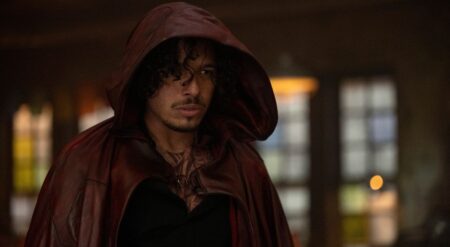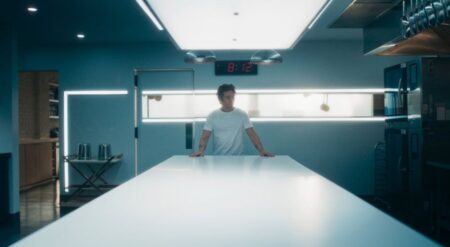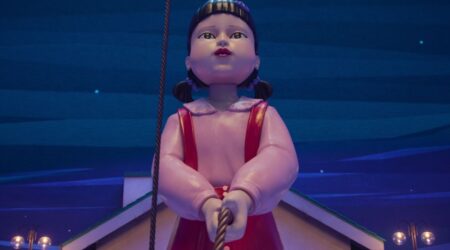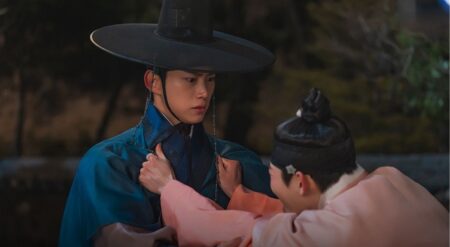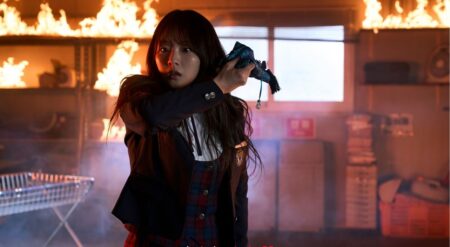
Pistol is FX’s adaptation of the rise of 1970s punk band Sex Pistols, based on guitarist Steve Jones’s biography, Lonely Boy: Tales from a Sex Pistol. Written by Craig Pearce and directed by Danny Boyle (Trainspotting), this series stars Toby Wallace as Steve Jones, Anson Boon as Jonny Rotten, Louis Partridge as Sid Vicious, Dylan Llewellyn as Wally Nightingale, and Sydney Chandler as Chrissie Hynde.
The opening scene of this six-episode mini-series brings us front and center to David Bowie performing on stage while Steve Jones is stealing Bowie’s stage gear—a rumor I’ve heard numerous times from friends in the alternative scene. It’s difficult not to feel immediately mesmerized by the creative vision Boyle brings to showcase the beginning of one of the most influential punk bands. The editing is choppy, the camera angles feel frenzied and too close for comfort, the music is loud, and the atmosphere is grimy. Pistol feels like a fever dream for any kid who has ever dipped their toes into the punk subculture because they felt lonely and isolated by the status quo.
Pearce’s script is bitting with pseudo-intellectual conversations occurring between Jones and Sex Pistols self-appointed manager Malcolm McLaren about the state of England, with Thomas Brodie-Sangster delivering an excellent and charismatic performance. What does it mean to be working class? Can art be created to be a statement against the establishment? Does music need to be good and played by professionals? Can angry kids lead a revolution? This is what Pistol explores.
From achieved footage of the Queen to clips of the working class of London, viewers are transported into a story ripe with anger for the world and time the Sex Pistols lived. Jones deals with familiar trauma, told through flashbacks that can feel out of place and rough. Sid Vicous is 19 years old with a heroin addiction, poor, and a turbulent relationship with a fellow abuser, Nancy Spungen. Johnny Rotten is also poor, disenfranchised, and jaded by the life he lives with nothing to lose. These musicians come together, with nowhere else to turn to and let Malcolm guide them into giving England the biggest middle finger.
The most interesting aspect of this mini-series is its exploration of how the Sex Pistols were created and formed to sell the image and idea of punk rock. Boyle captures the rawness of the movement with ease. There are many real-life portrayals of essential figures within the culture. Maisie Williams looks almost identical to Pamela Rooke (Jordan), a high-profile model who helped establish what punk fashion was with her bondage-inspired clothing from the SEX boutique in London to her dark, heavy black iconic raccoon liner. Siouxsie Sioux, another founder of punk/alternative fashion, is portrayed by Beth Dillon. She does a great job replicating Siouxsie’s gothic voice and her role in aiding the music scene’s shift to an alternative sound.
It’s clear that Pearce, Boyle, and their actors all worked in tandem to make Pistol feel authentic to the 70s. History is the underlying push factor for the narrative, and it’s best shown through Sydney Chandler’s performance as Chrissie Hynde, who eventually becomes the lead singer of The Pretenders (a personal favorite band of mine). Chrissie is written as the window into the work of rock as her relationship with Jones makes them come into contact with big stage names and influential music journalists.
There is so much that Pistol offers in terms of how the show looks, the atmosphere it cultivates, and its homage to punk rock. However, there isn’t a lot of depth explored within the show. Despite it being a show about the Sex Pistols, very few songs are utilized throughout the series, and viewers are frequently subjected to rehearing Anarchy in the U.K. For the most part, the performances are filled with angst, rage, and chaos but sometimes feel too forced. Characters like Jordan and Siouxie, who are integral to the rise of the punk, are one-note despite both Williams and Dillion giving everything they’ve got.
With subjects like fashion at the forefront, there are occasional scenes where viewers see Sid and other punks wearing swastika symbols. There are a few mentions about the punk movement having people brand themselves with the anti-Semitic symbol for pure shock value. However, it’s present throughout the show and feels gross to witness multiple times. Sid and Nancy’s relationship centers around their heroin addiction which eventually kills them. While Pistol does not glamourize these two tragic lovers, the flashy camera work of Boyle mixed with some weak story beats makes their relationship feel trivial, albeit a more respectful portrayal than I anticipated.
It’s hard not to love how Boyle brought to life this tale of anger, disenfranchisement, punk, drugs, and chaos. From executing interviews, scene recreations of famous Sex Pistols live performances, and intertwining real footage from the 70s British rock scene, Pistol feels like the center of the punk movement it emulates. Despite some of its narrative faults, lack of depth, and occasional muddiness, Pistol is a fun time for anyone who loves rock ‘n’ roll and for anyone who loves stories about misfits carving out space for themselves.
Pistol is available to stream on Hulu on May 31st, 2022.
Pistol
-
Rating - 8/108/10
TL;DR
Pistol feels like the center of the punk movement it emulates. Despite some of its narrative faults, lack of depth, and occasional muddiness, Pistol is a fun time for anyone who loves rock ‘n’ roll and for anyone who loves stories about misfits carving out space for themselves.


